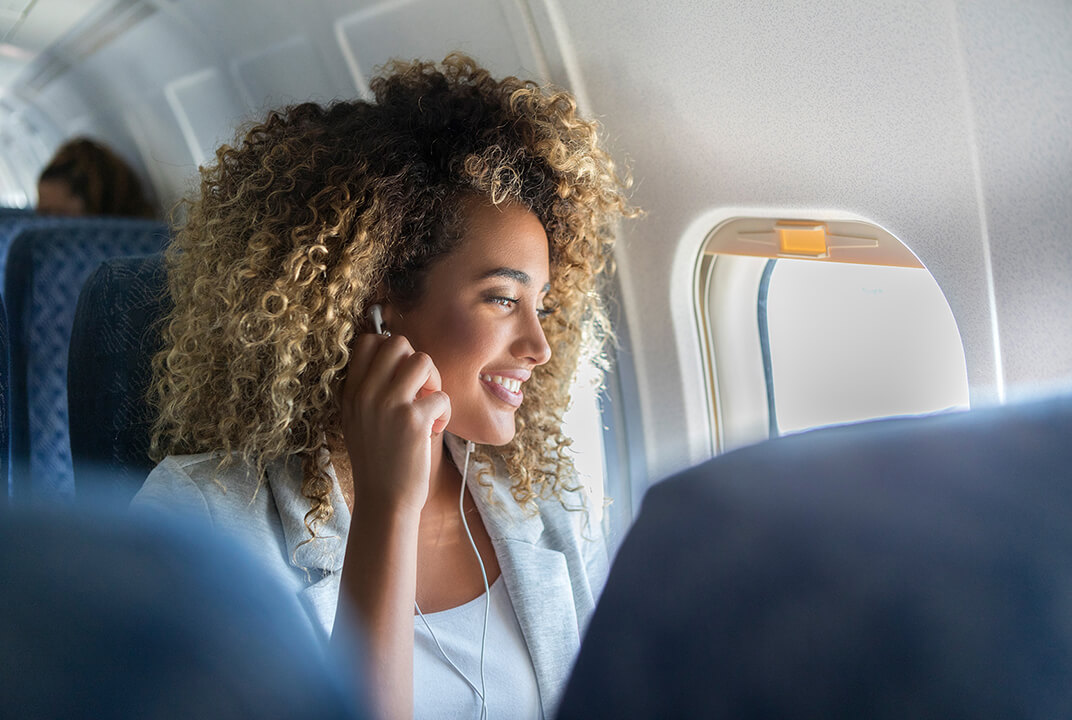Insight | The next generation of passengers
The next generation of passengers
Aviation
Generation Z delivers a new breed of passengers travelling in an unprecedented new era of connectivity. But how do they differ from millennials, and how does this affect airlines?
Picture this. There’s a flight that’s just started its descent to Singapore’s Changi airport. On board is 22-year-old postgraduate student Amy Hicks who’s flying in from Manchester, UK. The trip is swift, efficient, unremarkable.
But what is remarkable, at least to those who’ve been using airlines for many years, is how frictionless today’s flight-enabled travel experience can be.
Two days before, Amy received a message on her mobile alerting her to a flash sale on flights to Singapore – one of her bucket list destinations – so she swiftly bought them while on the move. After checking in at the airport via her mobile and seeing her luggage off courtesy of an automated end-to-end baggage delivery service, she skips the big queues at boarding thanks to facial recognition technology.
In the air, her mobile phone operator’s advanced roaming service instantly links her to the inflight Wi-Fi – no login or sign-up needed – and she books her first few days’ accommodation on her iPad after checking out recommendations on social media and browsing through TripAdvisor. Her subsequent itinerary is roughly sketched out online, in between catching up on two new episodes of Netflix’s latest show that dropped just before take-off.
When she lands in Singapore she’s arranged to be picked up, driven to her Airbnb and even ordered one of the city’s most acclaimed local dishes, pork ribs soup, to be delivered to her apartment shortly after her arrival.
Welcome to Generation Z
And while Amy may be fictitious, many of her experiences outlined above are either possible right now – or just around the corner. In her early 20s, she’s part of the Generation Z demographic. Born any time after the mid-90s and up to approximately 2010, these post-millennials have become the latest group of interest to global business.
Indeed, we’re living through pivotal times for Gen Z. According to analysis of UN data by Bloomberg, 2019 is the year that they will overtake millennials as the world’s most populous generation.
And while they do share some characteristics with Gen Y, there are also a number of important distinctions to be made. These differences could have major implications for the future of commercial aviation.
Spur of the moment
With many of them motivated by a desire to cross off bucket list destinations they’ve seen on social media, Gen Zers are more nimble travellers than previous generations.
Michel Karam, CEO and founder of the online travel planning platform, müvTravel, says travel is no longer a planned-in-advance, or even necessarily well prepared, activity.
“It’s an adventure that can happen at any time,” he explains. “At the spur of the moment.”
And this flexibility continues throughout their trip, so personalised, localised offers targeted at them while travelling will prove popular with this demographic. Speaking at the 2018 Phocuswright Conference in Los Angeles, Julie Hoffman, Adobe’s Head of Industry Strategy & Marketing, Travel & Hospitality, confirmed that there was high propensity for offers that are location-based, particularly when it comes to activities. She explained that for Generation Z, travel was a series of decisions that were taken throughout a trip.
Travelport Digital, an Irish company that specialises in digital travel solutions, believes travel companies can appeal to this demographic’s desire for immediacy by “proactively keeping them informed with real-time, contextual travel updates via mobile as they progress through their trips.”
Gen Z: mobile natives
If millennials were the first digital natives, then Gen Z are one step further along. They are true mobile natives. Lisa Lindberg, Vice President of Product Management, Expedia Group Media Solutions, says this generation is much more receptive to inspiration and information taken directly from the social media feeds on their smartphones.
“Gen Z travellers can be influenced by social media and advertising, especially appealing images and deals,” she says. “So marketers should implement a content-rich, mobile-friendly and multiplatform approach to successfully reach this valuable audience.”
Cost-conscious, experience seekers
Alongside the launch of the iPhone, the other event to define Generation Z was the financial crisis of 2008. Although this event didn’t affect them directly, it did affect their parents. As such, Jason Dorsey, co-founder of The Center for Generational Kinetics, believes Generation Z are more pragmatic when it comes to money and incredibly aware of price, describing them here as: “Fiscally conservative and focused on getting more value for their money.”
Research undertaken by Expedia Group Media Solutions confirmed this cohort as cost-conscious, as 93% admitted that they booked a trip because they believed it to be a good deal.
This is backed up by research by the WYSE Travel Confederation. Every five years, it undertakes its New Horizons Survey, a global analysis of the youth and student traveller. Its most recent survey, found that although Gen Z were fiscally responsible, they will spend if they think something offers value. Particularly when it comes to ‘social ammunition’, noting Gen Z like to ‘splurge’ on experiential purchases that they can promote on social media.
The survey said: “Adding unique, one-of-a-kind experiential elements to the basic travel journey might be more productive than trying to develop premium travel products.”
Like millennials, Generation Z’s ‘always on’ existence means they expect things to work in a seamless and frictionless manner. Travel tech provider Travelport Digital says that this is a key characteristic of the Gen Z travel experience.
“They now expect to be able to research, book, check-in, transact, review and manage multiple aspects of their travel all via their devices. Together with their millennial counterparts… they prefer self-service options during travel rather than interacting with staff. However unlike other generations, Gen Zers will not have the patience for travel brands that do not meet their autonomous traveller needs.”
This has clear implications for aviation: Airlines will increasingly look to own the entire travel journey – from booking flights to the journey to the airport and beyond. This is already reflected in the burgeoning Mobility as a Service (MaaS) sector, with a seamless journey being the ultimate aim of passengers.
Connectivity is the great enabler
Connectivity is a direct route to the hearts and minds of the new generation of passengers. When this group are booking holidays, flights and experiences off the back of a social media post or choosing accommodation, while in the air, following an online recommendation, connectivity is the lifeblood of their choices and actions.
This is backed up by the findings of Inmarsat’s most recent Global Inflight Connectivity Survey. Of those surveyed in the 18-30 range, 91% said they would use inflight Wi-Fi if it was available on their next flight. For airlines, this demand for connectivity presents a compelling opportunity to enhance customer loyalty and experience.
And of course, if they have a great experience they’ll be sure to let their peers know about it straight away, through social media of course. Indeed, it can surely only be a matter of time before inflight connectivity sees its first ‘meme moment’ – like the famous ice bucket or mannequin challenges – where the availability of Wi-Fi enables an aircraft-based social media craze.
Because the next generation are making their voices – and their choices – heard.


